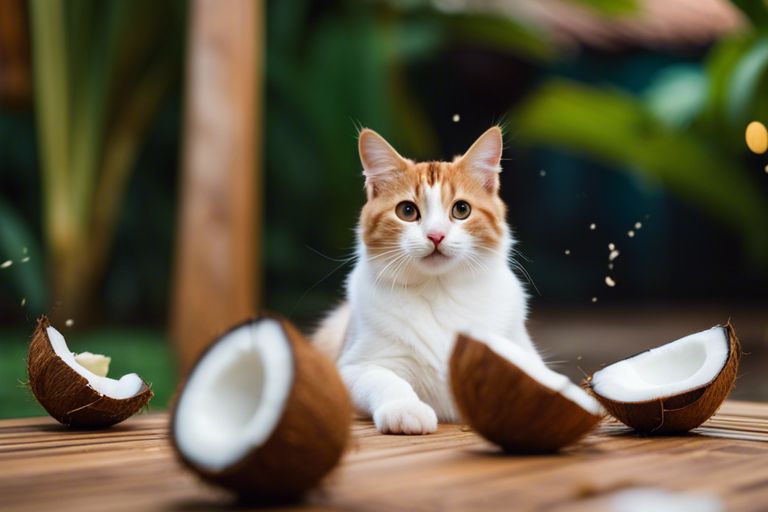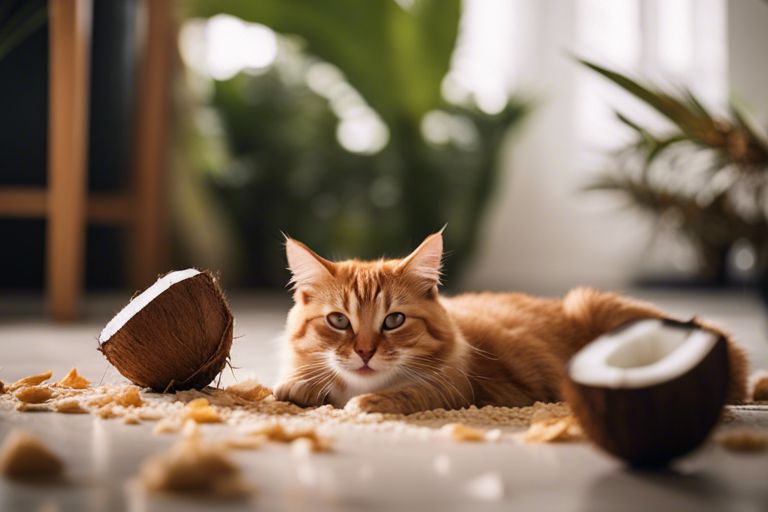Have you ever wondered whether cats can indulge in coconut like we do? While coconut may be a delightful treat for us, it’s essential to understand its potential effects on our feline friends. In this blog post, we will delve into the topic of whether cats can safely consume coconut, and the dangers and benefits associated with it.

Understanding Coconuts
If you have ever wondered about offering your feline friend some coconut, it is important to first understand what coconuts are and how they can affect your cat’s health.
Nutritional Content
Nutritional studies have shown that coconuts contain high levels of saturated fats and medium-chain triglycerides, which may provide certain health benefits for humans. Additionally, coconuts are rich in fiber, vitamins C and E, and various minerals such as iron and potassium. However, it is important to note that coconuts are high in calories, so feeding them to your cat in excess may lead to weight gain and other health issues.
Potential Benefits and Risks for Cats
With regards to cats, there is limited scientific evidence on the potential benefits and risks of feeding them coconuts. Some pet owners claim that coconut oil can improve their cat’s skin and coat, aid in digestion, and boost their immune system. However, it is essential to consult with a veterinarian before introducing coconut products to your cat’s diet. There are potential risks associated with feeding coconuts to cats, including gastrointestinal upset, pancreatitis, and obesity.
The coconut can be a divisive topic among pet owners, as some believe in its benefits while others are wary of its potential risks. It is crucial to approach the topic with caution and prioritize your cat’s well-being above all else.
Cats and Coconut Consumption
Now, let’s explore the relationship between cats and coconut consumption. Many pet owners wonder whether it is safe for their feline friends to consume coconut, and if so, in what forms.
Safe Forms of Coconut for Cats
To ensure the safety of your cat, it is important to understand which forms of coconut are safe for them to consume. Coconut oil is considered safe for cats in small amounts, as it can provide various health benefits such as improving their skin and coat, aiding in digestion, and boosting their immune system. Additionally, unsweetened coconut flesh or coconut water can also be safe for cats to consume, but it is important to monitor their intake and consult with a veterinarian before introducing these forms of coconut into their diet.
Forms of Coconut to Avoid
SafeIt is crucial to be aware of the forms of coconut that are potentially harmful to cats. Cats should never be given sweetened or flavored coconut products, as they contain added sugars and artificial ingredients that can be toxic to felines. Additionally, coconut shells or husks should be avoided, as they can pose a choking hazard or cause intestinal blockages if ingested by cats.
Cats are obligate carnivores, and while coconut can offer certain health benefits when consumed in moderation, it is important to be cautious and selective about which forms of coconut are suitable for your feline companion’s diet. As always, consulting with a veterinarian is recommended before introducing any new foods into your cat’s routine.

Recommendations for Cat Owners
To get a better understanding of the benefits and risks of feeding coconut to your cat, check out this insightful article on Cat superfoods – Coconut for a rich, tropical touch. It is important for cat owners to take the time to research and make informed decisions about what to feed their pets.
Feeding Guidelines for Coconut Products
Coconut should only be given to cats in small amounts occasionally. When feeding your cat coconut products, make sure it is plain coconut meat or coconut oil without any added sugars or flavorings. Keep an eye on your cat for any signs of digestive upset or allergic reactions, and discontinue if any issues arise.
Coconut water should also be given sparingly, as it contains a high amount of potassium which could be harmful to cats if consumed in large quantities. As always, it is best to consult with your veterinarian before adding any new food to your cat’s diet.
Alternative Treats for Cats
Alternative treats for cats can include small portions of cooked meat, such as chicken or turkey, as well as some fruits and vegetables like blueberries, carrots, or green beans. These treats can provide variety in your cat’s diet and can be a healthy alternative to traditional cat treats.
For instance, some cats may enjoy a small amount of plain Greek yogurt as a treat, which can also provide beneficial probiotics for their digestive system. Always introduce new treats in moderation and observe how your cat reacts to them.

Can Cats Eat Coconut? Is It Safe For My Cats?
Upon reflecting on the question of whether cats can eat coconut, it is clear that while coconut in small amounts may be safe for cats to consume, it is not a necessary or recommended part of their diet. The high fat content in coconut can lead to gastrointestinal upset and potential weight gain in cats. Furthermore, some cats may have allergies to coconut. It is always best to consult with a veterinarian before introducing any new food to your cat’s diet. In conclusion, while coconut may not be immediately toxic to cats, it is best to err on the side of caution and limit their intake of this tropical fruit.
FAQ
Can cats eat coconut? Is it safe for my cats?
While coconut is not toxic to cats, it is not recommended as a regular part of their diet. Coconut is high in fat and can cause stomach upset and diarrhea in some cats. It is best to offer coconut to your cat as a rare treat in small amounts to avoid any potential digestive issues.
What are the potential benefits of feeding coconut to my cat?
Coconut contains medium-chain fatty acids which may provide some health benefits for cats, such as promoting a healthy coat and skin. However, it is important to note that these benefits have not been extensively studied in cats, and therefore coconut should not be relied upon as a primary source of these nutrients.
How should I introduce coconut to my cat’s diet?
If you decide to offer coconut to your cat, it is important to do so in moderation and with caution. Start by introducing small amounts of fresh, unsweetened coconut to your cat’s diet to see how they react. Watch for any signs of digestive upset and consult with your veterinarian if you have any concerns about your cat’s tolerance to coconut.

Hello there, I am Iftekhar Ahmed. I am the owner of Mishka & The Cat Corners. I love to explore and write on various topics about cats

